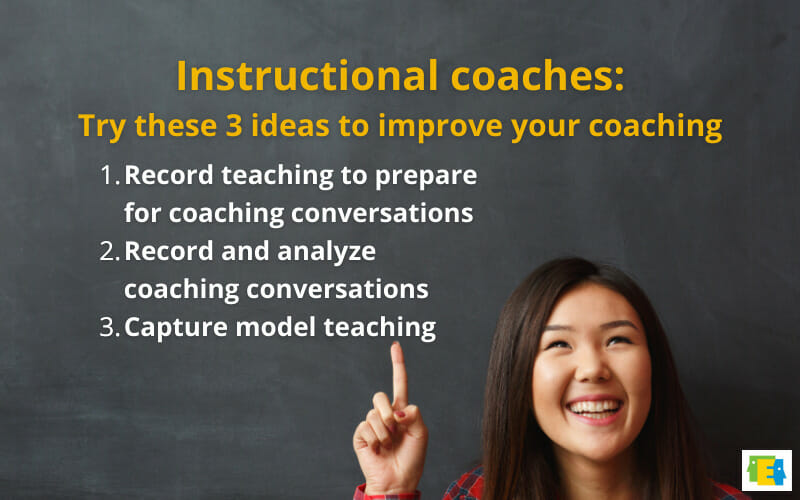Top 6 Strategies To Build Capacity As An Instructional Coach

Blog Posts Instructional Coach Resources At eduro learning, we have everything you need to #coachbetter designed by coaches for coaches. if you’re an instructional coach in a school setting or y. The instructional coaching improvement cycle supports teachers and leaders in effectively using pedagogical practices for personalization in order to support students in developing strong skills, strategies, and dispositions that are highly correlated to success in college and careers.

What Is An Instructional Coach Teaching And Leading Initiative Of A coach is an impact multiplier. through the teachers she or he supports, hundreds of students should experience instruction that continuously improves and adapts to their needs. but while many leaders would agree that the primary purpose of an instructional coach is to build instructional capacity in teachers, it can be challenging to define clearly the roles and responsibilities of coaches. Effective coaching requires active listening, deciphering needs, and then building capacity based on the strengths of teachers. by going slow, listening actively for the request in every complaint, and assuming positive intentions, coaches can better support and engage teachers in their important work. More broadly, effective coaching has the potential to support school improvement, to distribute leadership within schools, to build capacity throughout the school system, to develop leadership pipelines, and to enhance existing investments in professional development. Capacity building coaching focuses on assets, not deficits, and is carefully separated from evaluation and accountability systems. by proactively promoting two way communication across multiple levels in an instructional system (district teacher, principal teacher, teacher teacher), coaches help to build and connect of nodes of capacity.

Instructional Coaching Models Enhancing Teaching Strategies Effectively More broadly, effective coaching has the potential to support school improvement, to distribute leadership within schools, to build capacity throughout the school system, to develop leadership pipelines, and to enhance existing investments in professional development. Capacity building coaching focuses on assets, not deficits, and is carefully separated from evaluation and accountability systems. by proactively promoting two way communication across multiple levels in an instructional system (district teacher, principal teacher, teacher teacher), coaches help to build and connect of nodes of capacity. Side by side coaching, which provides an opportunity for coaches and teachers to learn together by reflecting on the teacher’s instruction and co developing approaches to solve problems.6 the strongest coaching programs: use well trained, expert coaches. emphasize strategies to include structured improve student engagement. feedback. Instructional coaches are invaluable partners for helping teachers and administrators stay on top of the ever shifting instructional landscape – but only if those coaches possess sufficient capacity themselves. without a well developed set of strategies to build their capacities, instructional coaches will struggle to provide meaningful support when faced with novel challenges or rapidly. Instructional coaching, as you likely know already, is an innovative approach to providing job embedded professional development for teachers. as you may also know all too well, the job descriptions of instructional coaches are often incomplete or nonexistent. in this course, you will receive clarity on the coach’s role; a plethora of strategies; and a compelling, strengths based focus to. The following resources provide additional information for school leaders and teachers to explore . these resources support stakeholders as they prepare to implement or grow effective coaching strategies that will help build school wide capacity and expand instructional practices and abilities.

3 Ways Instructional Coaches Can Use Video To Improve Teacher Coaching Side by side coaching, which provides an opportunity for coaches and teachers to learn together by reflecting on the teacher’s instruction and co developing approaches to solve problems.6 the strongest coaching programs: use well trained, expert coaches. emphasize strategies to include structured improve student engagement. feedback. Instructional coaches are invaluable partners for helping teachers and administrators stay on top of the ever shifting instructional landscape – but only if those coaches possess sufficient capacity themselves. without a well developed set of strategies to build their capacities, instructional coaches will struggle to provide meaningful support when faced with novel challenges or rapidly. Instructional coaching, as you likely know already, is an innovative approach to providing job embedded professional development for teachers. as you may also know all too well, the job descriptions of instructional coaches are often incomplete or nonexistent. in this course, you will receive clarity on the coach’s role; a plethora of strategies; and a compelling, strengths based focus to. The following resources provide additional information for school leaders and teachers to explore . these resources support stakeholders as they prepare to implement or grow effective coaching strategies that will help build school wide capacity and expand instructional practices and abilities.
Comments are closed.